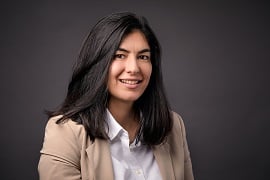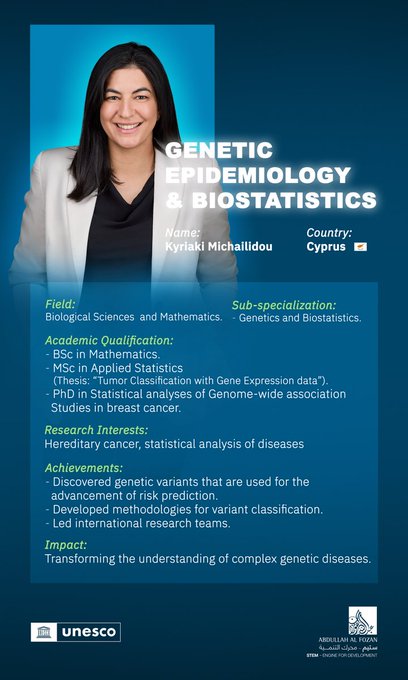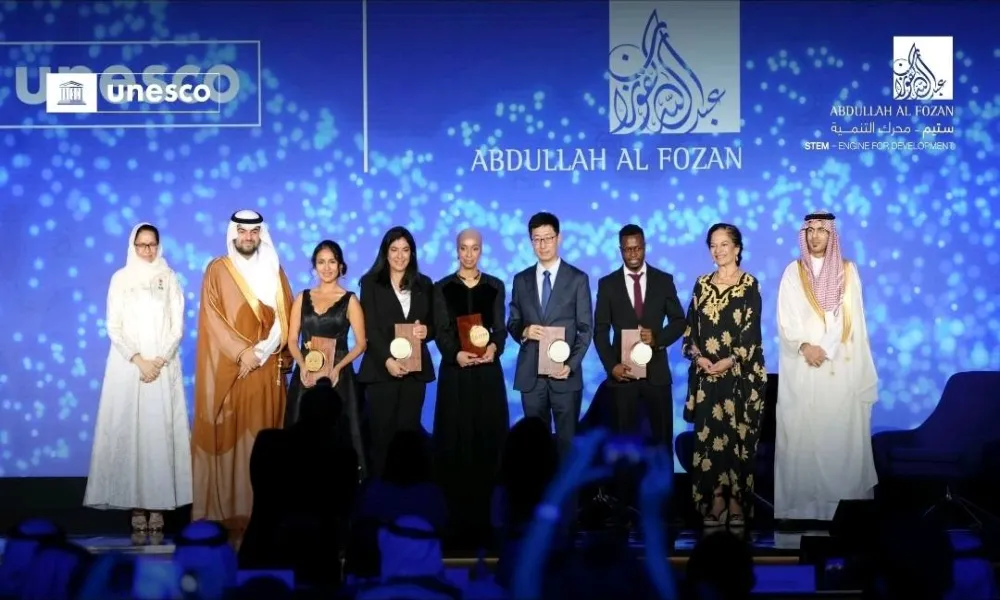UNESCO-Al Fozan laureate Dr Kyriaki Michailidou on turning statistics into lifesaving tools, showcasing important research done in Cyprus, and why an open mind can change a career and lives.

A recognition with purpose
For Dr Kyriaki Michailidou, the UNESCO-Al Fozan International Prize is not a personal trophy; it’s visibility, for the Cyprus Institute of Neurology & Genetics (CING), for the island’s scientific community, and for the concrete impact Cypriot research can have globally. The prize recognises a body of work, rather than a single paper, at the intersection of genetics, epidemiology and biostatistics, chiefly in breast (and increasingly ovarian) cancer risk prediction. She is Associate Professor and Head of CING’s Biostatistics Unit, and a visiting researcher at the University of Cambridge’s Centre for Cancer Genetic Epidemiology.

Earlier this year she was also named national winner of the Study UK Alumni Awards (Science & Sustainability, Cyprus, 2025), reflecting her academic path through Oxford (MSc) and Cambridge (PhD) and her work’s public-health value.
From mathematics to genetic epidemiology
Her route into public health began with mathematics (BSc) and moved through applied statistics (MSc). Her master’s thesis 'Tumor Classification with Gene Expression Data' introduced her to high-dimensional biomedical data and the power of statistical methods to answer clinical questions. A PhD in statistical analyses of genome-wide association studies (GWAS) in breast cancer set the trajectory for a career in genetic epidemiology and biostatistics.
What the UNESCO prize recognizes and why it matters
Unlike publication-specific prizes, UNESCO’s recognition highlights sustained advances that have shifted clinical practice. Dr Michailidou’s work has helped:
- discover and refine genetic variants used in risk prediction,
- develop methodologies for variant classification, and
- lead and coordinate large, international research teams.
This aligns with her roles within the Breast Cancer Association Consortium (BCAC) and the ENIGMA network, which pool global data to stratify risk and interpret germline variants. The practical bottom line: improved early detection and prevention strategies some of which are reflected in international clinical guidance.
Turning statistics into care: how the tools work
In familial breast cancer, individuals who meet clinical criteria undergo genetic testing; if a pathogenic variant is found in a high-risk gene, clinical guidelines change, more frequent screening, earlier imaging, risk-reducing options, and cascade testing for relatives. Michailidou’s work also shows that combinations of common and rare variants, captured in polygenic risk scores and gene-panel analyses, can flag elevated risk even in people with no family history. That widens the safety net from reactive care to proactive prevention.
Doing world-class science from a small country
Does Cyprus’ size limit discovery? Scale is a challenge, Dr Michailidou acknowledges, but the answer is collaboration and data quality. CING generates structured clinical-genetic datasets through its operations; these are analysed alongside international cohorts assembled via BCAC/ENIGMA and other partners in Europe, the US and Australia. Pooling enables discovery; Cyprus-specific analyses translate findings for local care. This dual approach, to “combine and contrast” large-scale and local datasets, is how a small country contributes to, and benefits from, global science.
The human side
There’s the scientist, and then there’s the schedule. International collaborations mean late-night calls across time zones after the children are asleep. Family support, practical and emotional, makes the long hours sustainable. She hopes that visibility from the awards will show young people in Cyprus, and especially girls, that scientific careers from Cyprus are both possible and impactful.
Michailidou also teaches the next generation of researchers through CING’s postgraduate programmes (Master’s and PhDs). The research horizon is widening: teams are extending methods honed in breast cancer to ovarian and pancreatic cancers, areas with pressing clinical needs where earlier risk stratification could shift outcomes.
Why the awards matter here
Awards unlock momentum; funding, partners, and the soft power to convene global teams around credible centres. In Cyprus, where science can slip beneath the daily news cycle, a UNESCO-level prize and other awards help normalise excellence. They signal to students that cutting-edge work isn’t somewhere else; it’s here, and it needs them.
Dr Kyriaki Michailidou’s story is not a leap but a line of exploration.
